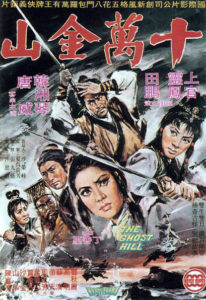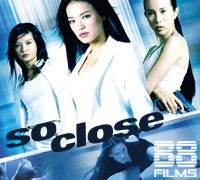Director: Ding Sin Saai
Cast: Tin Peng, Polly Shang-Kwan Ling Feng, Tong Wai, Go Ming, Chan Bo Leung, Shan Mao, Goo Liu Sek, Sit Hon, Man Chung San, Miu Tin, Lung Fei
Running Time: 90 min.
By Paul Bramhall
In 1971 the wuxia genre was still very much steeped in the conventions of the previous decade, however it was also becoming apparent that certain directors were gradually starting to explore those conventions from different angles. Over at the Shaw Brothers studio directors like Chang Cheh were moving away from the romanticised wuxia’s of the 60’s, instead creating bloody odes to heroism like The New One-Armed Swordsman, and King Hu was taking the genre into a more reflective direction with A Touch of Zen. However it was Taiwanese directors like Sun Yang and Ting Shan-Hsi that began to embrace the wilder side of wuxia, with the likes of the formers Forced to Fight (or as I watched it for the first time – Invincible Super Chan) offering up a rollercoaster ride of flag surfing, body decapitating, MMA-infused fun.
Another example is The Ghost Hill, which was already director Ting Shan-Hsi’s 9th production since debuting just 3 years earlier with 1968’s Like Father, Like Son. Shan-Hsi would begin his career under the supervision of King Hu, contributing to the script and acting as assistant director on Come Drink With Me in 1966, in which he also played an extra, his only time to ever appear in front of the camera. Once Jimmy Wang Yu found himself exiled to Taiwan, it would be Shan-Hsi who became his go to director, with the pair collaborating on 8 movies over the course of the 70’s encompassing the likes of Furious Slaughter, Knight Errant, and A Queen’s Ransom (as an interesting aside, they’d pair up once more for Shan-Hsi’s final movie, with 1993’s The Beheaded 1000). The Ghost Hill was made the year before he’d cross paths with Jimmy Wang Yu, and instead sees him directing a trio whose names are synonymous with Taiwanese wuxia.
We first meet Tien Peng (The 18 Bronzemen, Jade Dagger Ninja) and David Tang (The Saviour Monk, Dynasty) as a pair of swordsmen about to engage in a duel next to the sea overseen by an old master. On the line is possession of the purple light magic sword (note: no it’s not a light sabre). After the fight ends seemingly without any conclusion, the old master awards Peng the sword, much to the chagrin of Tang. Confronting the old master as to why his opponent was deemed the winner, we get the first indication that The Ghost Hill has aspirations to be a cut above the average sword clanger. The old master revisits the duel that once more plays onscreen, this time pointing out all of the moments where Peng could have killed him, with the action freezing whenever a deadly strike could have been delivered. It’s smart filmmaking, not dissimilar to the technique Peter Chan would use 40 years later in his own Wu Xia with Donnie Yen.
As with any prized sword in a wuxia flick though, other less righteous characters are also after the prestige that comes with being its owner, and the golden faced (literally) King Lion is first in line, subsequently hatching a sneaky plan to make it look like Tang steals the sword, and have him and Peng kill each other. The plan almost works, but thankfully swordswoman Polly Shang-Kuan (The Ghostly Face, The Zodiac Fighters) is able to make them see through it, and they eventually team up and travel to Hell’s Castle on Ten Thousand Gold Mountain to set things right. It won’t be an easy journey though, as complicating matters is the fact that both Peng and Tang have their eyes on Shang-Kuan as potential suitors, resulting in a constant underlying tension between our male leads, exasperated by Tang’s need to prove himself after losing the duel.
While the plot of The Ghost Hill certainly isn’t anything ground-breaking even by 1971 wuxia standards, and indeed doesn’t feature any ghosts on a hill or otherwise, it’s more than made up for by its energetic execution, colourful characters, and elaborate set designs. Hsueh Han (One Armed Boxer, The Killer Meteors) plays King Lion as a rotund bad ass with a harpoon gun for an arm, golden skin, and who isn’t averse to throwing anyone who looks at him the wrong way into a bath of boiling oil, resulting in a painful death. He’s the kind of villain who bathes in the same boiling oil that kills mere mortals, has whole conversations that consist of villainous laughter, and worst still is raising the child of one of his victims who believes him to be her real father, but in fact is just waiting for her to ‘come of age’ so he can marry her. To top it all off, he’s a master of the Gold Light Fire Flow Kung Fu style, which says it all.
The joy in watching The Ghost Hill is just how imaginative the world is that Shan-Hsi creates onscreen. The assassins who King Lion employs to ensure our heroes never reach the castle come with a variety of exotic weaponry, the funniest of which appears to be what can best be described as paperweights in the shape of Chinese characters, which when thrown at their target result in certain death. There’s also an early version of a flying guillotine, with a pair of pincered scissors on the end of a chain resulting in one of the best head decapitation scenes ever committed to film. It needs to be seen to be fully appreciated. The action itself is choreographed by Chen Shih-Wei, in what would be his first gig choreographing solo. Shih-Wei would go onto choreograph the likes of The One Armed Boxer and The Swift Shaolin Boxer, and his work here is fitting to the early 70’s style.
It’s serviceable, but much closer to what was found in the likes of the previous decades The One-Armed Swordsman than the more intricate style that would prevail later in the decade. Movements are slow, and whenever the action goes empty handed there’s a distinct lack of power, with Peng’s ability to knock out nameless lackeys with a single karate chop failing to convince. An early attempt at undercranking also goes hilariously wrong, resulting in a fight scene that literally plays out in fast forward, almost making some of Donnie Yen’s 90’s efforts seem slow in comparison. However for the era these elements are forgivable, and it’s clear that Shan-Hsi was aiming for a different aesthetic than his contemporaries. Sword strikes are often accompanied by what looks like the entire contents of a blood bag being sprayed by someone offscreen, and we get a legitimately tense face off involving the consumption of a watermelon.
The pièce de resistance though is saved for the extended finale, which sees our heroes need to navigate the 10 Gates of Hell’s Castle, each one of which leads into a different room designed to make sure anyone who enters it doesn’t leave. Dangers include being frozen, blown to pieces, burnt alive, and all manner of booby traps in a sequence that gives Chang Cheh’s House of Traps from more than a decade later a solid run for its money. Culminating in the final door, imaginatively titled the Thousand Poison Hell, our heroes are left to face off against King Lion armed with his harpoon arm, the purple light magic sword, and all the while attempting not to breathe in the fumes from the deadly fauna they’re surrounded by. The sets here are colourful and creative, and while the budget may not be on par with its Shaw Brothers contemporaries over in Hong Kong, it’s clear Shan-Hsi has made the budget he did have at his disposal go a long way.
There’s a lot to enjoy in The Ghost Hill, and despite its fantastical elements and the way they’ve obviously aged in the succeeding 50 years since it was released, almost all of the entertainment it delivers is exactly what the filmmakers intended. Sure there’s some goofy moments, and I have to mention the badly timed part where a lackey throws himself off a bridge into the stream below from a sword strike, just as a pair of swans swim out from under it. However for the most part Shan-Hsi makes it easy to be invested in what’s onscreen, with the trio of Tien Peng, David Tang, and Polly Shang-Kuan perfectly cast as the archetypal wuxia heroes out to dispense justice to a dastardly villain. While Hong Kong wuxia from the Shaw Brothers studio and alike usually gets the most attention from fans of the martial arts genre, productions like The Ghost Hill prove that the output from Taiwan is more than worth a look. You won’t regret it.
Paul Bramhall’s Rating: 8/10





Yowza! This sounds like a must-see, and I’ve had it on my shelf, unwatched, for years. That’s a great review Paul, and I’ll be checking GHOST HILL out real soon.
It should probably be noted the Polly Shang-kuan and Tien Peng appear to actually be (far more fancifully) reprising their roles from Swordsman of all Swordmen in this movie. Also, the character that was played by Nan Chiang in SWAS is here played by Wei Tang.
Additionally, the character referred to as King Lion in some versions is actually the Lord of the Underworld (the dude who appears on Chinese Hell Notes), and his colorful minions are demons and spirits that those familiar with Chinese folklore might recognize.
Pingback: Seashore of the Conflict Gods | Blu-ray (Eureka) – Ykine